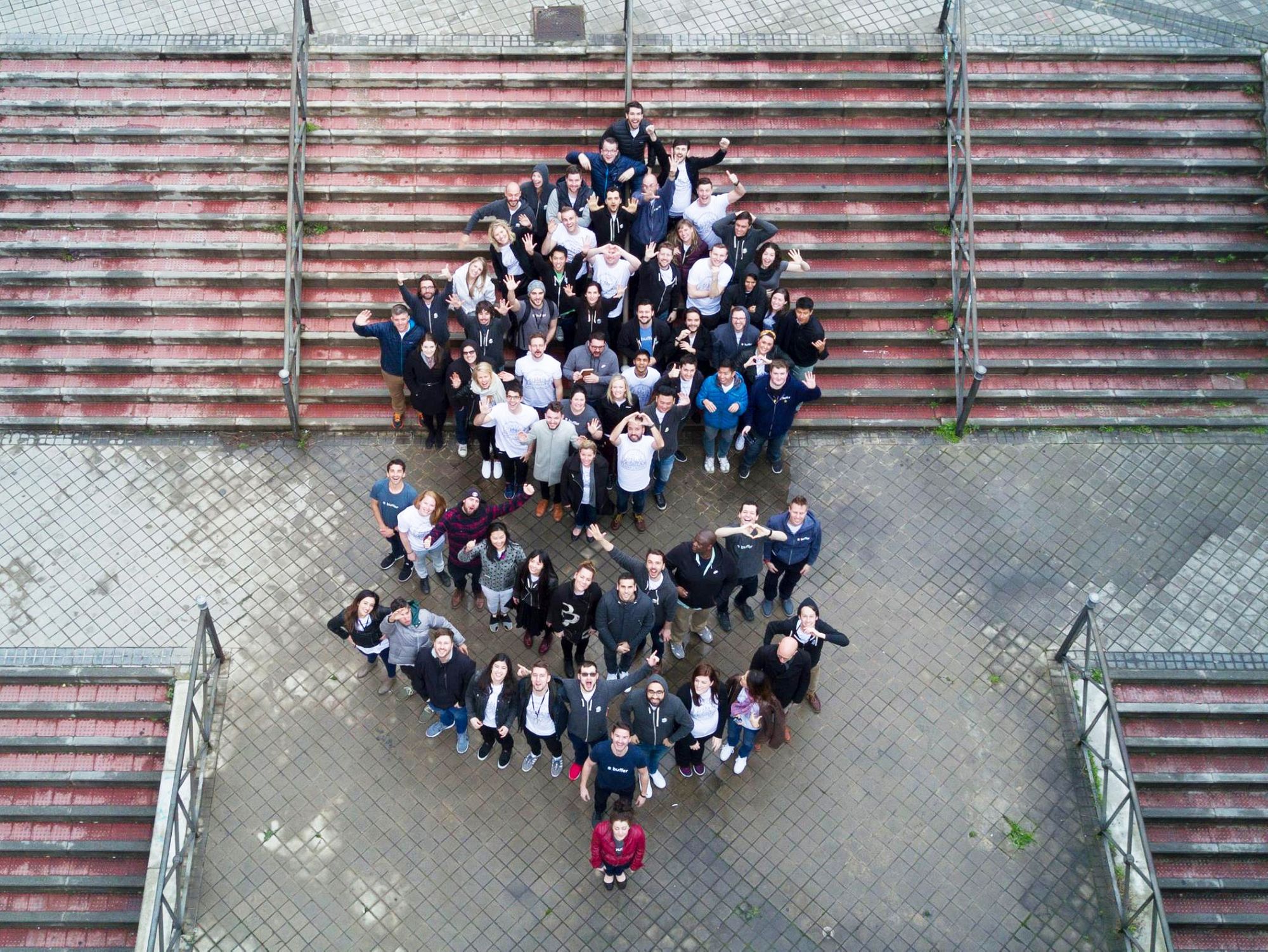
Join us as we share what we’re learning as we build a company that approaches work from a fresh perspective. We write about workplace culture, our finances, and our business decisions and strategies.

2017 was an exciting year for the Buffer team with some big changes, a few firsts, and some major progress forward. We set a new vision for the company and products , went on our 8th company retreat to Madrid , calculated equal pay at Buffer for the first time, and got to a very healthy place financially, among many other

The end of the year is a wonderful time to focus on reflection and self-care. These are things we’ve been very mindful of at Buffer in the past few years. Everything from encouraging more vacation time to having summer hours have been top of mind for us in creating a company focused on healthy and happy employees. Often times the year flies by so quickly that people don’t take enough vacat

bThere are very few moments when a Terms of Service agreement gets the spotlight. They crop up during the signup process then linger in the footer of a web page. On occasion, whenever the terms change, you might receive an email notification to let you know. Many people click through these terms with equal parts automation and trust, believing that the company behind the terms will be doing the right thing by them, the customer. This is exactly the trust we hope to engender at Buffer, and we f

Heads up! We’ve updated our transparent salary formula since this post originally was published. Learn more about the latest formula and see all the team’s current salaries here . Four years ago we introduced transparent salaries at Buffer. The practice has in many ways come to define us. We’re proud of this, and the positive impact that it has had both within the team and in the wider community. A growing company brings change and new learnings. Over time, our tea

There is a lot of imagery that comes to mind when someone says “working from home.” A quick Google Search yields results that are anything from someone working on the floor surrounded by pets, to people holding babies during calls, to someone working in pajamas. Source: Ray Wenderlich A lot of these things (the pajamas and family at least) are things you can’t always do at a regular office. Sometimes the pets

Until pretty recently, we didn’t have a “product process” at Buffer when it came to how we built the product. Initially, we were proud of our super lean approach with an engineer or two collaborating with a product manager and figuring it out as they went along. This worked well when we were smaller, but as our team grew and we wanted to build more ambitious products , timelines started to get unrealistically long and we were shipping cars all in

I recently had a video call with Buffer’s Director of People, Courtney . She asked me, “How is it feeling to work in your timezone?” That might seem like a rather odd question, but the reason why she asked is illustrated below: That’s me, over on the right. Right now, I’m the only person in Australia working in a company of 70+ people, spanning 12 different timezones. After reflecting on what it’s like to work in a one-person timezone, I thought I’d share

Buffer Transparency Report Q3 2017 * Last quarter’s report * All Transparency reports * All Buffer reports MRR $1,312,614 ARR $15,751,368 EBIDTA $957,883.16 (+38.3%) Paying customers 76,293 (+3.8%) Q3 Revenue 3,840,296.81 (+8.16%) Cash in bank $4,367,158 (+23.5%) In the past seven years that we’ve been building Buffer a lot has changed. The Buffer product has evolved, the social net

It’s pretty difficult to get excited about research, right? It’s not exactly the most flashy subject and I don’t really know any kids who dream of doing customer research when they grow up. Yet, if you dig into the practices of the most successful companies of the past few decades such as Amazon , Airbnb , and IBM [https://www.amazon.com/Who-Says-Elephants-Cant-Dance/d

Hi there! This is an older post that we’ve kept around for transparency but that means that sometimes the information is no longer accurate. Head to our homepage to view our most recent posts. Imagine working at a company where on your first day the CEO says: “We are really excited to have you here. Now, how can I use my personal network to help you get your next job?” That’s exactly how Jon Bischke from Entelo kicks off the first day for his employees on day on

Have you ever been curious about other people’s processes? How they start their day, how they work remotely, or how they focus their energy levels? I definitely have, and I know so many people who feel the same way. After all, what better way to learn than by looking at what is working for others! We’re fortunate to have access to an incredible community at Buffer, and over the years we’ve collected actionable advice from this community during our weekly bufferchat on Twitter [https://buffer.c

The ability to change one’s mind, change course and try again is one of the things I like most about working at Buffer. It’s totally normal to share about not just successes but also times we didn’t know the answer, mistakes we’ve made and experiments we’ve tried that didn’t quite turn out like we thought they might. So even though the last time I wrote about performance reviews it was to share why we don’t do them, it’s not actually that weird (at least at Buffer) to return to the topic only

Like many other tech companies, we used to have an unlimited vacation policy as a way to encourage employees to take vacation days when it felt best to them. When unlimited vacation didn’t seem to be working, because it’s hard to tell how much time unlimited really is, we switched to a minimum vacation policy this time last year. With our unlimited policy, the highest percentage of vacation days was in the range of 5 – 10 days per year, closely followed by the 10 – 15 days range. It wasn’t quit

The “Buffer Bootcamp” is a rite of passage that’s long been a staple of our culture at Buffer. This is the 45-day period that all new teammates at Buffer have embarked upon as they joined the team. Traditionally, the “bootcamper” has acted as a freelancer/contractor for their first 6 weeks, working on a probationary basis – no healthcare benefits, equity, or team retreats just yet. They generally receive lots of hands-on coaching and feedback as they learn the ropes of Buffer. It’s been a tim

There’s this powerful myth that exists in the working world: the more you work and less you rest, the more you will get done. It turns out that our bodies and our brains don’t quite work that way. What’s surprising is that the opposite is in fact true. If you rest more and work less, you’ll be more productive, healthy, and creative. Not to mention, one author believes more rest can positively impact climate change and gender equality — I’ll elaborate on all of that below. We gave this a try a

When we think of continued learning and self-improvement, reading naturally comes to mind. That’s why we’re so excited to be celebrating International Literacy Day, a global celebration planned by UNESCO. This celebration is a strong reminder of how digital technology and the internet enables each of us to do more reading, writing, and learning. Source: UNESCO We have more ways than ever to get access to books and reading materials. But how much reading are we doing? One survey reports that “[

Impostor syndrome is a psychological phenomenon in which people are unable to see their own accomplishments, dismissing them as luck, timing, or as a result of deceiving others into thinking they are more intelligent and competent than they believe themselves to be. Impostor syndrome is much more common that you’d think—o ver 70% of people have experienced it at one time or other in their lives . It is known that lots of entrepreneurial and high-achieving women have it, but I’ve also found th

Hi there! This is an older post that we’ve kept around for transparency but that means that sometimes the information is no longer accurate. Head to our homepage to view our most recent posts. We believe in constant experimentation and self-improvement at Buffer. You might know this if you’ve followed along with our trying self-management or making regular changes to our vacation policy [https://buffer.ghost.

Names create an identity that people can associate with, they create perceptions and they let customers know what to expect. There is a lot of power in them. When it comes to a company or product name it can be one of the “most valuable assets a company possesses” according to this Nielsen study. They also share that the power in brand names comes from the fact that they can lend credibility, assure

MRR $1.23m ARR $14.8m QoQ 7.48% Paying customers 73,503+4.98% MAU 302,710+2.99% WAU 186,594+0.21% * Net income: $705,146 (+244.68%) * Cash in bank: $3.5m (+26.29%) 72 team members across the worldThings have been moving ahead at Buffer at a fast and exciting pace. This is partly as a result of our new experiment with six-week cycles as a team. These short periods of focused time working on key projects have been very impactful for us since we’ve implemented them. We’re keen to keep lean

“How do you know that people are actually working if you’re all at home?” This is a question many of us get asked at Buffer. We’re a fully remote in multiple time zones around the world, and unless you’ve experienced remote work in this way, it can be a bit tricky to wrap your head around. Specifically, this question of how to tell who’s actually working is one of the major curiosities. To put the question another way, perhaps what people are really asking is how trust functions in an environm

Can you remember where you were seven years ago? I was in my apartment in Birmingham, UK, coding up the very first version of Buffer as a tool to schedule tweets. So much has changed since then: the Buffer product has evolved, the social networks themselves have matured, and social media managers have grown exponentially in skills and influence. Today, I’m excited to share an early look at what we believe these ch

Engineers tend to be hardwired for knowledge sharing. Because of our Buffer culture , contributing to the open source community has never been an uphill battle. We’ve never had to “convince” anyone that this a good idea and that we should let engineers spend time on it

One happy side effect of Buffer’s value of defaulting to transparency and sharing lots of what we’re working on and going through as a company is that you get to have lots of great conversations. Folks from other companies read what we’re up to and share advice about similar situations, or share a challenge they’re going through and ask for advice. And the No. 1 question I get asked is this: How does a company begin to approach the topic of diversity and inclusion for the first time? Folks are